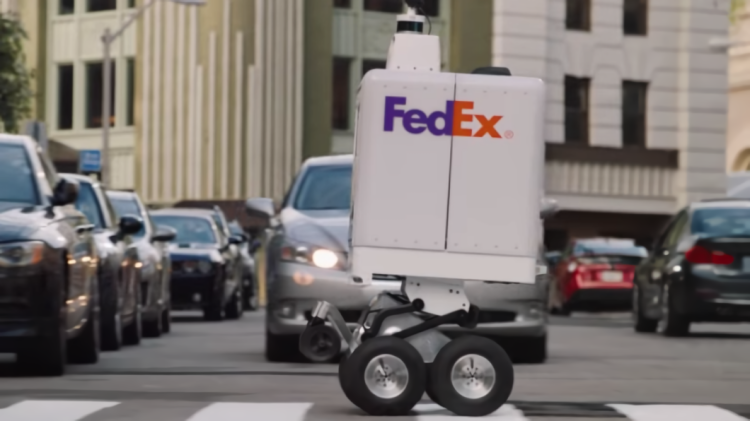Watch all the Transform 2020 sessions on-demand here.
(Reuters) — FedEx this summer plans to begin testing a robot to handle home deliveries for partners ranging from Walmart to Pizza Hut.
Shippers, retailers and restaurants are experimenting with robots, drones and self-driving cars in a bid to use automation to drive down the high cost of delivering gadgets, groceries and even cups of coffee the “last mile” to consumer doorsteps.
FedEx is teaming up with Deka Development & Research Corp, whose founder Dean Kamen invented the Segway stand-up scooter and iBot stair-climbing wheelchair, for its project. The delivery company said the robots could become part of its SameDay service that operates in 1,900 cities around the world.
The battery-powered robots look like coolers on wheels. Cameras and software help them detect and avoid obstacles as they roam sidewalks and roadways at a top speed of 10 miles per hour.
June 5th: The AI Audit in NYC
Join us next week in NYC to engage with top executive leaders, delving into strategies for auditing AI models to ensure fairness, optimal performance, and ethical compliance across diverse organizations. Secure your attendance for this exclusive invite-only event.
The project must win approval in test cities, including the shipper’s hometown of Memphis, and the first deliveries will be between FedEx office stores.
On average, more than 60 percent of merchants’ customers live within three miles of a store location. FedEx said it is working with its partners, which also include AutoZone and Target, to determine if autonomous delivery to them is a viable option for fast, cheap deliveries.
The “last mile” to the home accounts for 50 percent or more of total package delivery costs. Restaurants pay third-party delivery companies like Uber Eats, DoorDash and GrubHub commissions of 10-30 percent per order.
Investors and companies are pouring millions of dollars into projects aimed at lowering those costs and overcoming regulatory hurdles. For safety reasons, many states want autonomous vehicles to have humans as emergency backup drivers.
Starship Technologies, which has raised more than $40 million in venture funding, last year deployed robots to deliver packages in the San Francisco Bay Area.
In January, it teamed up with French food service company Sodexo to take Starbucks, Dunkin’ Donuts, and Blaze Pizza orders to the 40,000 students at George Mason University’s Fairfax, Virginia, campus. That service costs $1.99 per order.
Amazon is testing its own delivery robot dubbed “Scout.”
FedEx rival United Parcel Service (UPS) is not testing robots — but like FedEx and Amazon, it is experimenting with drone deliveries.
Other tests include tie-ups between grocery seller Kroger and self-driving car startup Nuro, as well as DoorDash and General Motors’ Cruise Automation.
(Reporting by Lisa Baertlein in Los Angeles; Editing by Sonya Hepinstall)


